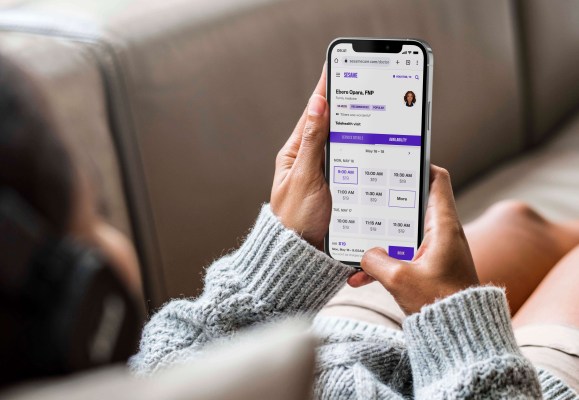Products You May Like
Access to quality and affordable healthcare has long been an issue in the United States.
Not everyone can afford health insurance and even for those who can, medical care can still be cost-prohibitive.
Sesame, a startup that aims to address those issues with its online medical care marketplace, has raised $27 million in a Series B financing round led by GV (formerly Google Ventures) to advance its efforts.
New York City-based Sesame is a two-sided marketplace populated by physicians and patients only. Consumers are able to research and shop for a physician — and book an appointment — on its site. The startup claims that it is able to lower the price of healthcare by cutting out the bureaucracy and rules associated with health insurance and giving consumers a way to access physicians — including specialists — on a pay-per-visit basis.
Another advantage for consumers, the company says, is that they have the ability to be treated virtually — and in some locales, in person — for a price that is provided upfront with no surprises later. In fact, just over 60% of Sesame patients have some form of insurance. But the transparency, Sesame touts, is appealing. Physicians, some of whom have their own practices, like the idea of getting paid in cash without having to deal with the paperwork, costs and headaches associated with filing with insurance companies.
The company claims to offer “complete, longitudinal health care,” including primary care, acute consults and chronic care management, 40-some specialties, dentistry, labs and imaging. There are over 2,500 healthcare providers on its marketplace, covering all 50 states. Its services have been live since mid-2020 and has since served “in excess of” 150,000 patients.
CEO and co-founder David Goldhill told TechCrunch in an interview that Sesame’s goal is to deliver “half-price, whole quality” medical care. The average price paid for care on its marketplace, he said, is around $40 and some visits can cost as little as $25. Sesame is a “true marketplace,” he said, in that physicians and providers work for themselves.
“Every service on Sesame has a fixed, clear price that the patient pre-pays so there is no collection or credit issues for doctors,” said Goldhill, who penned an article called “How American Health Care Killed My Father,” and is former president and COO of Universal Television Group. “Also, they don’t have all the admin requirements that go along with insurance claims.”
And since the physicians are actually competing with each other, he added, pricing is “competitive.”
Sesame makes money by charging a percentage of the charge of each visit. It must be doing something right. It claims that it has been growing 25% month-over-month and has grown revenue nearly 500% year-over-year — although we don’t know from what base.
Sesame cites statistics that it believes illustrate the need for a service such as the one it offers.
According to the 2020 U.S. census, 28 million Americans at that time did not have health insurance. Also, according to research, some 53% of American workers covered by private health insurance through their employer were enrolled in high-deductible health plans that same year.
The marketplace currently has a membership offering in beta, SesamePlus, that it plans to roll out broadly this year — giving people the opportunity to pay an annual membership on Sesame for $99, or for a monthly fee of $10.99. Unlike other telehealth offerings that are predominantly membership-based such as One Medical, Sesame does not require a membership to be seen but members do get a discount on visits and services, the company says, as well as other benefits.
The startup also differs from One Medical in that it offers access to specialties, whereas the latter is focused on primary care. It is also a marketplace, whereas One Medical is not. Notably, GV is also an investor in One Medical, which went public in 2020 and has a market cap today of about $1.35 billion. The firm did not comment when asked if it viewed Sesame and One Medical as competitors.
Cathy Friedman, executive venture partner at GV, told TechCrunch via e-mail that GV’s life sciences team aims to invest in companies that improve lives and patient outcomes, and that she believes that Sesame’s “approach to more accessible and affordable healthcare is compelling.”
“Sesame will help drive better health outcomes for a meaningful percentage of historically underserved populations by connecting patients to high-quality, low-cost in-person and virtual care,” she said. “Sesame has successfully built a dynamic marketplace for medical care services — a concept that addresses a historically unmet need.”
Virgin Group, TeleSoft Partners and FMZ Ventures also participated in the latest round as new investors, alongside existing backers General Catalyst, Industry Ventures, Coefficient Capital, Giant Ventures and Alumni Ventures Group. The financing brings Sesame’s total equity raised since its 2019 inception to $75 million.
The startup will use its new capital primarily to transition its membership product from beta into general availability.
